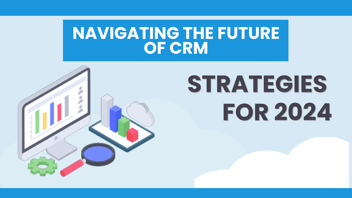Enhancing Trust and Efficiency in Financial Interactions
Introduction:
In the financial services sector, where trust and client relationships are paramount, Customer Relationship Management (CRM) systems play a crucial role. Financial institutions, from banks to investment firms, can leverage CRM to not only manage client data but also to deepen client relationships and streamline operations. This blog will explore the unique benefits and applications of CRM in the financial services industry, highlighting how it can enhance client engagement, regulatory compliance, and operational efficiency.
Role of CRM in Financial Services:
• Overview:
Introduce the importance of CRM in managing client relationships in the financial sector.
• Benefits:
Discuss the various benefits of CRM in financial services, including improved client management and enhanced data security.
Key Applications of CRM in Financial Services:
1. Personalized Client Experiences:
Explain how CRM systems enable personalized communication and services tailored to individual client needs and preferences.
2. Compliance and Reporting:
Highlight CRM's role in aiding compliance with financial regulations and simplifying reporting processes.
3. Efficient Client Onboarding and Management:
Discuss how CRM can streamline client onboarding processes and ongoing client management.
Integrating CRM with Financial Systems:
• Technical Integration:
Address the integration of CRM with existing financial systems for a unified approach to client data and management.
• Data Utilization:
Explore how the data collected through CRM can be utilized for better client insight and strategic decision-making.
Challenges and Solutions in Implementing CRM:
• Identify common challenges in implementing CRM in financial services, such as data security concerns and system customization.
• Provide solutions and strategies for effective CRM implementation in the financial sector.
Measuring the Impact of CRM in Financial Services:
• Discuss how to measure the effectiveness of CRM in financial services, focusing on client satisfaction, retention rates, and operational efficiency.
Conclusion:
CRM systems in financial services are more than just tools for data management; they are integral in building and maintaining strong client relationships, ensuring regulatory compliance, and enhancing operational efficiency. By effectively leveraging CRM, financial institutions can foster trust, deliver personalized services, and streamline their operations.
About CETDIGIT:
CETDIGIT offers specialized CRM solutions tailored to the needs of the financial services sector. Our expertise in platforms like Salesforce and HubSpot enables us to provide CRM strategies that address the unique challenges and opportunities in financial services, helping institutions build stronger, more profitable client relationships.
CRM for Financial Services: Building Stronger Client Relationships

Popular Post
- Nostalgia Marketing’s Power with Millennials & Gen Z
- Sales and Sales Development in 2024: Why AI is a Must-Have for Growth
- SaaS Founder's Bible: The Rise, Fall, and Future of SaaS (2020-2025)- Part 1: Navigating Market Shifts
- What is Salesforce CRM?
- CETDIGIT's Innovative Approach to Salesforce & HubSpot CRM Implementation
Subscribe
Similar Blogs

CRM Evolution: AI's Transformative Role
In the ever-expanding realm of customer relationship management (CRM), Artificial Intelligence (AI)...
READ MORE
Navigating the Future of CRM: Strategies for 2024
IntroductionAs we approach 2024, the landscape of customer relationship management (CRM) continues...
READ MORE
Navigating the E-commerce Landscape with CRM Integration
The e-commerce landscape is increasingly competitive, with businesses vying for a larger slice of...
READ MORE
Leave a Comment